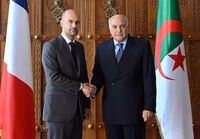In a significant diplomatic thaw, French Foreign Minister Jean-Noël Barrot visited Algeria on April 6, 2025, marking the end of an eight-month diplomatic dispute between the two nations. Barrot's visit included a lengthy meeting with his Algerian counterpart Ahmed Attaf and a two-and-a-half-hour discussion with President Abdelmadjid Tebboune. This visit is seen as a pivotal moment in restoring relations that had soured dramatically over the past year.
During his discussions, Barrot emphasized the need to "turn the page on current tensions," expressing a desire to return to a cooperative relationship rooted in mutual respect and effectiveness. He stated, "All topics were put on the table," highlighting the comprehensive nature of the talks. The minister's visit follows a crucial phone call on March 31 between French President Emmanuel Macron and President Tebboune, which laid the groundwork for renewed dialogue.
Barrot's meetings were not just symbolic; they yielded concrete outcomes aimed at rebuilding the partnership between France and Algeria. Among the key announcements was the reactivation of various cooperation mechanisms, particularly in security and migration. A meeting of high-ranking intelligence officials has already been planned, alongside a strategic dialogue concerning the Sahel region, where both nations share common security concerns.
In addition, Barrot addressed the pressing issue of migration, indicating that discussions would resume within the framework of existing agreements. He noted that a meeting between French prefects and Algerian consuls is on the agenda, with further talks anticipated on the sensitive topic of obligations to leave the territory, a point of contention that has strained relations.
On the economic front, Barrot acknowledged the challenges faced by French businesses in Algeria, particularly in sectors such as agribusiness, automotive, and maritime transport. Trade between the two nations has plummeted by as much as 30% since the summer of 2024, a decline that has raised alarms among business leaders. To combat this downturn, a meeting between business representatives from both countries is scheduled for May 9 in Paris, aiming to revitalize economic ties.
Barrot also brought attention to the case of Boualem Sansal, a Franco-Algerian writer recently sentenced to five years in prison for comments deemed offensive to Algeria's territorial integrity. Barrot urged President Tebboune to consider a "gesture of humanity" toward Sansal, suggesting that a reduction in his sentence or a presidential pardon could facilitate his early release. The Algerian judiciary has appealed the initial ruling, indicating that this issue remains sensitive and unresolved.
The current diplomatic rapprochement comes after a period of unprecedented tension between Algeria and France, which began in the summer of 2024. The crisis escalated following Macron's endorsement of Morocco's autonomy plan for Western Sahara, a territory claimed by the pro-Algeria Polisario Front. This endorsement led Algeria to recall its ambassador from Paris, signaling a major diplomatic rift.
Further complications arose with the arrest of Boualem Sansal, which intensified existing tensions. In early 2025, relations deteriorated even further when Algeria refused to deport several influencers at France's request, leading to public accusations from French Interior Minister Bruno Retailleau against Algeria following a terrorist attack in France involving an Algerian national.
Reflecting on the past months, Barrot remarked, "The period of tension experienced serves neither the interests of Algerians nor those of the French." He underscored the shared commitment of both leaders to restore cooperation for the mutual benefit of their peoples. The Algerian newspaper L'Expression interpreted this diplomatic thaw as a return to normalcy in relations, suggesting that it demonstrates the impossibility of a complete rupture between Algeria and France.
The discussions held during Barrot's visit signal a new chapter in Franco-Algerian relations, one that aims to rebuild trust and cooperation after a tumultuous period. As both nations look to the future, the focus will be on addressing shared challenges, fostering economic ties, and ensuring stability in the region.




